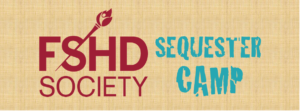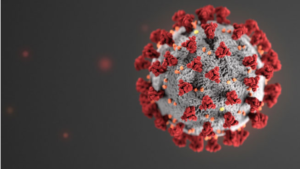As communities everywhere take steps to reduce transmission of COVID-19, we would like to share some information provided by our panel of medical advisors.
- For most individuals with FSHD, the risk of serious illness from COVID-19 infection is the same as the general population. The CDC and MDA websites provide detailed information about who is most at risk and how to avoid getting infected.
- In general, older adults (over 50 years of age), especially those with chronic illnesses like heart disease, diabetes, taking medications that suppress the immune system and those with lung disease have the highest risk of serious illness.
- About 10-25% of individuals with FSHD develop what is known as restrictive pulmonary disease due to weakness of the chest wall muscles. They are probably at slightly higher risk because of issues with a weakened cough in order to clear secretions. Although COVID-19 doesn’t seem to be associated with a lot of secretions, secondary pneumonia is common and could be a problem.
- If you have FSHD-associated respiratory problems, you should consider yourself at higher risk for serious illness regardless of your age and should take extra precautions to avoid getting infected. This applies to anyone who is using nighttime ventilation or is at or below 50 percent of the predicted value for forced vital capacity (FVC), maximal inspiratory pressure, and peak cough flow.
- If you get sick, inform your care providers that you have restrictive pulmonary disease and should not receive oxygenation without ventilation (e.g. BiPap or NVS). This can cause you to retain carbon dioxide and stop breathing.
- If you need to go to the emergency department, take your BiPAP with you. Whether your device can be used in the hospital will vary according to hospital policy. BiPAP can generate aerosol droplets and so care needs to be taken to avoid viral transmission. However, if providers are wearing protective clothing, this may not be an issue.
- Alternatively, use a ventilator with active circuits with exhalation valves that can have filters attached to them.
- Download and carry our Medic Alert Card to warn emergency medical care providers that you have FSHD.
How the FSHD Society is responding

Our community’s health and well-being are our highest priority. While we must maintain social distance, it’s important that we all stay connected. To support our community, we have launched our FSHD Society Sequester Camp, with weekly webinars, radio shows, story time, and resources to help. Check it out!
Due to the risks posed by COVID-19, particularly to people with FSHD, we have decided to postpone the April 21 Voice of the Patient Forum. The meeting remains vitally important to us, and so we are working to reschedule it.
If you have already registered to attend in-person, you will receive priority in re-registering once we have set a new date. Please contact the Marriott hotel directly to cancel your room reservation. It’s our understanding that the major airlines are allowing flights to be cancelled and rebooked without incurring the usual cancellation and change fees.



Dette var til meget god hjelp. Meget bra info ang korona viruset og hvilken risiko gruppe jeg kommer inn under.
Melder meg gjerne på for å få alt nytt ang FSH. Jeg har levd med sykdommen i snart 40 år og fra å være en sjømann og til å sitte i elektrisk rullestol.
Mvh Karl Henriksen
“This was very helpful. Very good info on the corona virus and what risk group I come under.
Feel free to call me to get everything new about FSH. I have lived with the disease for almost 40 years and from being a sailor to sitting in an electric wheelchair.”
Thank you for your kind comments!
I have FSHD and am 74. I use a electric wheelchair. I am becoming curious about the eventual progression and outcome.
Thanks.
Here are practical suggestions that I am using with my (non-FSHD) patients that may be of interest to our community as well:
– get 90-day supply of your meds in case you are quarantined and cannot go out to get new ones.
– if you use supplemental oxygen make sure you have a good compressor, not just tanks which could run out.
– make sure you’ve had the pneumovax. Some patients that do poorly with covid-19 get a secondary bacterial pneumonia (“superinfection”) and the vaccine reduces that likelihood.
– load the app or save the web site from a telemedicine provider (some insurers offer this service for free or low cost). You might need care in the future and it may be unwise to venture out if you develop symptoms.
– have everyone around you wash their hands vigorously and frequently (this is obvious).
– don’t panic, most people who get the coronavirus will have symptoms between a mild virus and bad flu, but not worse than that. However, given weakened muscles associated with breathing in patients with FSHD, stay vigilant. Seek care if breathing becomes difficult.
Thank you for all your efforts on our part. I hope this mad run to buy and stock subsides. There are many who need alcohol to clean our cough assist machine and other equipment. New York just announced a stay at home alert. We need to stay in contact with neighbors who may need someone to shop for them
Any advice much appreciated.
My husband has FSHD and type 1 diabetes. He is in isolation. I am wondering if I should do the same to protect him. I am a dentist and come into contact with lots of individuals and we do not have the necessary PPE equipment. My employer is being less than helpful/sympathetic with this situation.
Thank you in advance for any guidance.
We’re sorry that your employer is not being helpful. You should take whatever measures you can to avoid contracting the virus yourself or to spread it via contaminated clothing, etc. Healthcare workers are taking such measures as removing shoes and clothing before entering the home, bagging the clothing and putting it directly into the laundry, and taking a shower before interacting with anyone in the household. They are also leaving outside any items that don’t need to be brought into the house and disinfecting items that do need to come inside. There’s a helpful video on our “Sequester Camp” page showing how to disinfect items. Stay safe!
Been in isolation 6 weeks, my husband is also in isolation, luckly he works from home. Our garage is our decontamination area. People drop stuff off, my husband sprays and/or wipes it down before bringing it in. At first I though we might be over doing it. Not anymore. I can’t cough, covid scares me.
Hi could anyone help me I have received a letter from NHS telling me to shield . I have Fshd I am no medication. Only problem I have is I get short of breath going up hills I want to return to work and follow the distance rules . Any one got any advice .
Follow public health advisories about maintaining social distancing, wash or disinfect hands after coming in contact with surfaces that could be contaminated (e.g. door handles, public touch pads, etc., avoid touching your face (wear a mask if that helps), avoid crowded, enclosed spaces.
I’m 74 and have FSHD. I use oxygen at night. If I lay down for a nap I have to use oxygen. I have a hard time breathing when I’m on my phone setting up. I’ve tried 3 times to get a vaccine shot here in FL but can never get into the website. They distribute vaccines to all the Publix grocery stores. The last time my closest Publix had 4,000 vaccines. I still couldn’t get in!
I’m getting scared
Would traditional vaccines and the new Novavax vaccine that do not involve muscle cells (as the RNA/vector vaccines do) be safer options for FSHD patients?